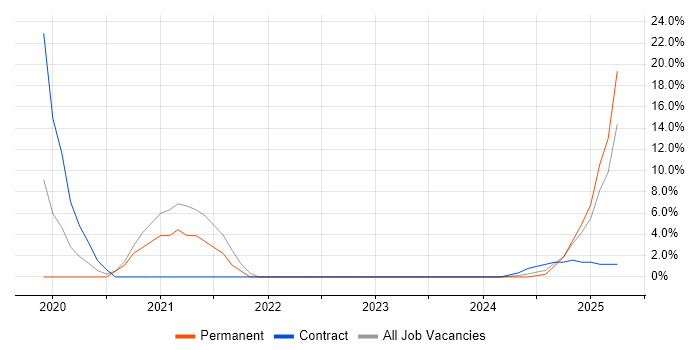PostgreSQL (Postgres)
Buckinghamshire > Bletchley
The table below provides summary statistics for permanent job vacancies advertised in Bletchley requiring PostgreSQL skills. It includes a benchmarking guide to the annual salaries offered in vacancies that cited PostgreSQL over the 6 months leading up to 1 May 2025, comparing them to the same period in the previous two years.
| 6 months to 1 May 2025 |
Same period 2024 | Same period 2023 | |
|---|---|---|---|
| Rank | 11 | - | - |
| Rank change year-on-year | - | - | - |
| Permanent jobs citing PostgreSQL | 3 | 0 | 0 |
| As % of all permanent jobs advertised in Bletchley | 6.98% | - | - |
| As % of the Database & Business Intelligence category | 30.00% | - | - |
| Number of salaries quoted | 3 | 0 | 0 |
| 10th Percentile | £44,250 | - | - |
| 25th Percentile | £46,875 | - | - |
| Median annual salary (50th Percentile) | £52,500 | - | - |
| 75th Percentile | £53,750 | - | - |
| 90th Percentile | - | - | - |
| Buckinghamshire median annual salary | £52,500 | £45,000 | £61,250 |
| % change year-on-year | +16.67% | -26.53% | +13.95% |
All Database and Business Intelligence Skills
Bletchley
PostgreSQL falls under the Databases and Business Intelligence category. For comparison with the information above, the following table provides summary statistics for all permanent job vacancies requiring database or business intelligence skills in Bletchley.
| Permanent vacancies with a requirement for database or business intelligence skills | 10 | 0 | 2 |
| As % of all permanent jobs advertised in Bletchley | 23.26% | - | 6.45% |
| Number of salaries quoted | 10 | 0 | 0 |
| 10th Percentile | £37,250 | - | - |
| 25th Percentile | £44,688 | - | - |
| Median annual salary (50th Percentile) | £55,000 | - | - |
| 75th Percentile | £61,250 | - | - |
| 90th Percentile | £62,000 | - | - |
| Buckinghamshire median annual salary | £60,000 | £52,500 | £52,500 |
| % change year-on-year | +14.29% | - | - |
PostgreSQL
Job Vacancy Trend in Bletchley
Job postings citing PostgreSQL as a proportion of all IT jobs advertised in Bletchley.

PostgreSQL
Co-occurring Skills and Capabilities in Bletchley by Category
The follow tables expand on the table above by listing co-occurrences grouped by category. The same employment type, locality and period is covered with up to 20 co-occurrences shown in each of the following categories:
